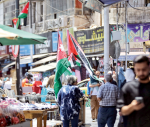You are here
King’s termination of peace treaty annexes unites Jordanians
Oct 23,2018 - Last updated at Oct 23,2018
There is a national sense of relief, pride and euphoria following His Majesty King Abdullah’s historic decision Sunday to terminate two annexes in the Jordan-Israel peace treaty relating to Israel’s use of Jordanian lands. The so-called “special regime” covering Baqoura and Ghumar will end in November 2019, 25 years to the day since the signing of the peace treaty, but notice of termination must be given by either party one year before. The King’s decision ended weeks of speculation over the issue that has put the government under pressure from lawmakers, political parties, professional unions and the general public.
In a Tweet on his official Twitter account, the King said that “Baqoura and Ghumar have always been at the top of our priorities”, adding that “our decision is to terminate the Baqoura and Ghumar annexes from the peace treaty out of our keenness to take all decisions that would serve Jordan and Jordanians”.
Baqoura, a strip of agricultural land at the confluence of the Jordan and Yarmouk rivers in northern Jordan, was occupied by Israel in 1950, while Ghumar in southern Jordan was captured by Israel between 1968 and 1970. Both lands were returned to Jordanian sovereignty under the peace treaty, but Israel was allowed to use them for a period of 25 years.
The concept of “leasing” these lands to Israel was always a subject of controversy for the majority of Jordanians, who saw it as an affront to national pride. The issue of the expiry of the annexes was raised often but more so following last year’s deliberate killing by an Israeli diplomat of two Jordanians at the Israeli embassy compound in Amman. Jordan’s demands, which included putting the Israeli security guard on trial, compensation to the families of the victims and an official apology, were not all met by Israel’s Prime Minister Benjamin Netanyahu.
It was always believed that a final decision on the fate of Baqoura and Ghumar will require careful consideration by the Jordanian government in light of its impact on tense relations with Israel. It is now clear that the King has made such a decision after weighing all options and reactions. This is a major move by the King at a time of difficult regional circumstances, as he himself told a group of Jordanian political figures on Sunday. He added that Jordan’s priority is to protect its interests and that Jordan will implement its full sovereignty over its lands.
Reacting to the Jordanian decision, Netanyahu was quoted as saying that Israel plans to negotiate with Amman to ensure that the entire deal remains intact. “There is no doubt that the entire agreement is important and dear to both our countries. We will negotiate with Jordan for its extension,” he said. The annexes allow for bilateral discussions and Israel will attempt to politicise the issue despite the fact that Jordan is within its right to terminate the agreement.
There are issues that need to be dealt with before the termination takes effect. For example, the Baqoura land was sold to a Jewish businessman, Pinhas Rutenberg, for public use by the British mandate authority in 1921 provided that he does not transfer ownership to a third party. But Rutenberg sold most of the land to Jewish settlers in 1929 and the deeds were officially registered in Jordan. While Jordanian sovereignty over Baqoura is not in question, the fact that most of the land there is privately owned by Israelis will be the main stumbling block.
The Jordanian government can buy the land back or if that fails then the Israeli owners will be treated under Jordanian laws that cover foreign land ownership in the Kingdom.
Domestically, the King’s decision is a much-needed shot in the arm for the government at a time when it is facing public pressure over its unpopular economic policies. The current euphoria will boost national unity and divert attention, for some time, from the difficult economic decisions that the government and parliament will be taking by the end of the year.
But when it comes to relations with Israel anything can happen. Jordan has been in the forefront in its rejection of US and Israeli moves on Jerusalem, illegal housing units in the West Bank and Amman’s role in the protection of Muslim and Christian sites in the Holy City. Israeli provocations, especially with regard to Al Aqsa Mosque, are expected to continue. Moreover, the entire region will undergo major policy challenges if and when US President Donald Trump announces his regional peace plan.
But for now, Jordanians will unite behind their leadership while celebrating this historic and bold decision. Israel, on the other hand, will get ready to engage the Kingdom in protracted negotiations in an attempt to extract concessions.
Osama Al Sharif is a journalist and political commentator based in Amman













